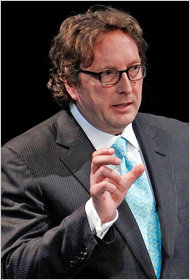PARIS — Spain’s borrowing costs plummeted Tuesday at a debt auction, helping to lift the euro and stocks, as the European Central Bank began rolling out a new lending program that could encourage banks to buy euro-zone government bonds.
The Spanish Treasury sold €5.6 billion, or $7.3 billion, of debt, more than the €4.5 billion it had planned to sell after it met with solid demand. It sold three-month bills priced to yield 1.74 percent, down from the 5.11 percent it paid to sell similar securities on Nov. 22. It also sold six-month debt securities at an average yield of 2.44 percent, compared with the 5.227 percent it paid in November.
The euro bounced up to $1.3120 Tuesday, from $1.2998 late Monday in New York. U.S. stocks opened higher Tuesday, following major European stock indexes, which rose around 2 percent.
The solid result will come as welcome news for Mariano Rajoy, who will take office Wednesday as prime minister of Spain. Analysts attributed the positive result — as well as a strong Spanish auction last week — partly to the new E.C.B. initiative.
The program, officially known as a long-term repo operation, “is very important,” Laurent Fransolet, a European rate strategist at Barclays Capital in London, said. “but it’s not easy to understand, so many commentators haven’t been focusing on it.”
Mr. Fransolet cautioned that the main purpose of the operation was not to bolster euro-zone sovereign debt, but rather to ensure banks had the funds to refinance themselves “for a long time.”
The E.C.B.’s new facility does, however, make it possible for banks to borrow from the central bank to fund purchases of government bonds. Using the so-called carry trade, a bank that borrows at 1 percent and buys bonds that yield 4 percent pockets 3 percentage points of yield as income.
The euro-zone credit market has been hurt by the seemingly endless debt crisis
, with the E.C.B. warning Monday
that some indications were showing levels of stress greater than in the immediate aftermath? of the Lehman Brothers collapse of September 2008.
The E.C.B. will announce the results of its three-year liquidity injection on Wednesday morning, and there is wide uncertainty over the degree of demand. In a Reuters poll, traders estimated banks would ask in aggregate for as little as €50 billion to as much as €450 billion.
“Given the ongoing stresses in the banking system, we expect there to be high demand for these loans,” Ben May, an economist in London with Capital Economics, said in a research note. “Nonetheless, we doubt that banks in the region’s most troubled economies will go for broke and purchase vast quantities of their governments’ debt in a bid to bring bond yields down and avoid damaging sovereign defaults.”
The central bank’s policy move “is something very big,” Mr. Fransolet said, but he questioned whether it represented “a complete change of direction” for the euro zone.
“I think you need a lot of other things,” he said. With a huge round of government debt up for refinancing next year, he added, “The jury is still out.”
In a reminder of the sword hanging over the heads of European leaders, Fitch Ratings warned that the AAA rating it has assigned to the debt issued by the euro-zone bailout vehicle, the European Financial Stability Facility, “largely depends on France and Germany retaining their AAA status.”
Fitch noted that its decision last week to revise the outlook for France to “negative” meant that the risk of a downgrade of the bailout fund had also risen.
Article source: http://www.nytimes.com/2011/12/21/business/global/successful-spanish-debt-auction-helps-lifts-euro-and-stocks.html?partner=rss&emc=rss
